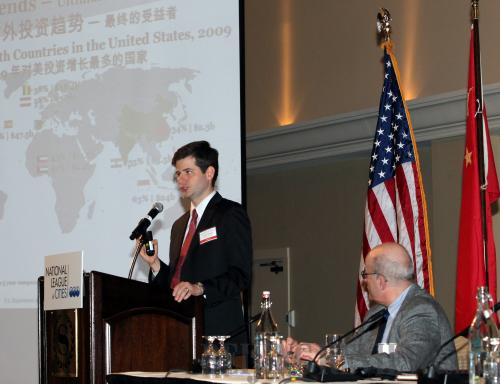|
 |
|
INVEST IN AMERICA: Christopher Clement, an official with the U.S. Department of Commerce, gives a presentation during a Seattle investment forum aimed at promoting Chinese direct investment in U.S. cities on April 20, 2011 (WANG CHENGYUN) |
Problems arose when a CFIUS official noticed a founder of 3Leaf Systems had changed his personal information on LinkedIn, a social networking website, from founder of 3Leaf Systems to Huawei consultant. CFIUS was quick to intervene, and this $2-million deal was quickly deemed a possible risk to U.S. national security.
A flurry of actions was taken whereby Huawei had to declare this small deal to CFIUS. After CFIUS called on Huawei to sell the technology assets it had bought from 3Leaf Systems, the Chinese company applied for a presidential review and wanted U.S. President Barack Obama to make a final decision. This was shocking to most Washington lawyers specializing in cross-border transactions.
Faced with pressure from the U.S. Government, Huawei withdrew its takeover of 3Leaf Systems in February 2011. It was the third time Huawei failed to purchase assets in the United States in recent years.
Every country has the right to protect its national security, but did Huawei's acquisition of 3Leaf Systems' technology assets pose a viable threat to the United States? Judging from 3Leaf Systems' size, this conclusion is groundless.
Moreover, 3Leaf Systems is a manufacturer with advanced cloud computing technology—the provision of computational resources, like programs and databases, on demand via a computer network. But cloud computing is not a 3Leaf-exclusive technology. Google was the first to promote this concept in 2006 with its Google Document applications. There are many other cloud computing companies in China and the United States, and 3Leaf Systems is not even a recognized leader among cloud computing companies.
Based on this assessment, it's safe to say the United States was engaging in trade protectionism in the name of defending its national security.
Adaptation
In addition to Huawei, CFIUS has rejected a series of Chinese investment bids in the United States in the past year, including the Northwest Non-ferrous International Investment Co. Ltd.'s investment in Firstgold, a U.S. mining and exploration company, and the Caofeidian Investment Group's investment in Emcore, a U.S. optical fiber manufacturer.
China is a new player in the international direct investment market. Governments, institutions and the public need time to adapt to the style of a new player. This is only natural. China is willing to invest enough patience and time to enable more countries and stakeholders to get used to the expansion of Chinese investment overseas.
It is essential then for the United States to adopt a more open-minded and embracing method of accepting this expansion. For any country, pouring talent, capital and goods into another market to spur growth and develop relationships leads to prosperity. The United States has risen to its top position among global players because of this. But, from Huawei's many frustrations in entering the U.S. market, the international business community has seen the once open American spirit droop.
The author is an associate research fellow with the Chinese Academy of International Trade and Economic Cooperation of the Ministry of Commerce
Key Figures
- China's FDI in the United States by 2009: $3.338 billion
- China's FDI in developed countries by 2009: $18.17 billion, accounting for 7.4 percent of China's total FDI
- Share of manufacturing sector investment in China's total outward FDI by 2009: 5.5 percent
- Ratios of manufacturing firms to China's total overseas investors: 45.5 percent in 2007, 42.7 percent in 2008 and 31.9 percent in 2009 | 